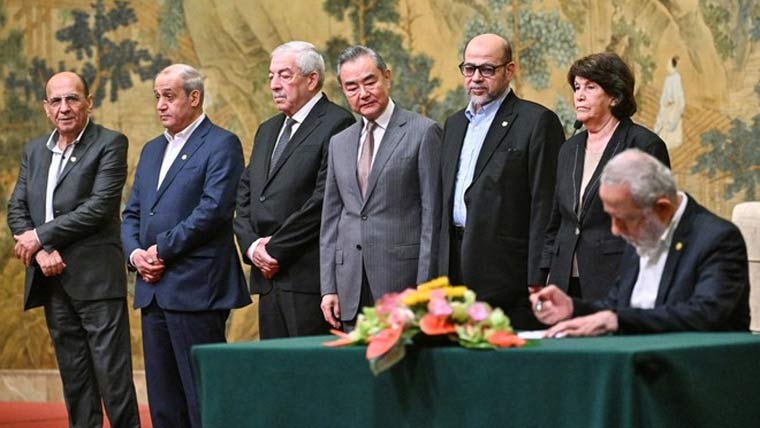China’s Role in Mediating Palestinian Groups: A Comprehensive Analysis
Introduction
In recent years, China’s political influence has extended beyond its borders, reaching into regions historically dominated by Western powers. One such region is the Middle East, where China’s involvement with Palestinian groups has garnered significant attention. China’s efforts to mediate between these groups, aiming to foster unity and peace, have raised questions about its potential impact on the Gaza-Israel conflict and its overall role in global politics. This article explores China’s political strategies, the potential outcomes of its involvement, and its standing as a major player on the global stage.
China’s Political Strategies in the Middle East
China’s approach to the Middle East, particularly regarding the Palestinian issue, reflects its broader diplomatic philosophy of non-interference, economic collaboration, and fostering peace through dialogue. Key strategies include:
- Diplomatic Engagement:
- Bilateral and Multilateral Diplomacy: China has engaged in both bilateral talks with Palestinian groups and multilateral forums to address the Palestinian issue. This dual approach ensures a comprehensive understanding of the regional dynamics and facilitates broader consensus.
- Hosting Dialogues: China has hosted multiple rounds of talks involving Palestinian factions, encouraging them to resolve internal differences and present a united front.
- Economic Investments:
- Belt and Road Initiative (BRI): China’s BRI has extended into the Middle East, offering economic incentives to countries and groups willing to engage in peaceful cooperation. For Palestinian territories, this includes potential infrastructure investments that hinge on political stability.
- Trade Partnerships: China has positioned itself as a key trading partner for many Middle Eastern countries, leveraging economic ties to influence political stances.
- Soft Power and Cultural Diplomacy:
- Educational and Cultural Exchanges: China has promoted educational and cultural exchanges to build goodwill and mutual understanding with Middle Eastern countries, including Palestinian territories.
- Media and Public Diplomacy: Chinese media outlets have increased their presence in the Middle East, promoting narratives that highlight China’s role as a peace-broker and economic partner.
China’s Mediation Efforts with Palestinian Groups
China’s mediation efforts have focused on fostering unity among Palestinian factions, primarily Hamas and Fatah, which have been at odds for years. Key actions include:
- Facilitating Dialogue:
- High-Level Meetings: Chinese officials have organized high-level meetings between leaders of Hamas and Fatah, emphasizing the need for a unified Palestinian stance.
- Conflict Resolution Workshops: China has hosted workshops aimed at conflict resolution, involving experts and facilitators to help Palestinian groups navigate their differences.
- Encouraging Political Reforms:
- Governance Training: China has offered training programs for Palestinian officials to enhance governance capabilities, which are essential for political stability and unity.
- Support for Elections: China has advocated for free and fair elections within Palestinian territories as a means to legitimize leadership and foster unity.
- Economic Support:
- Humanitarian Aid: China has provided humanitarian aid to Gaza and the West Bank, with the condition that it benefits all Palestinians and not just specific factions.
- Infrastructure Projects: Potential investments in infrastructure projects are tied to political stability and unity among Palestinian groups.
Impact on the Gaza-Israel Conflict
China’s involvement with Palestinian groups has potential implications for the Gaza-Israel conflict:
- Unified Palestinian Front:
- Stronger Negotiating Position: A united Palestinian front could negotiate more effectively with Israel, potentially leading to a more balanced peace process.
- Reduction in Internal Clashes: Reduced internal conflicts among Palestinians could lead to more focused efforts on addressing the larger conflict with Israel.
- International Pressure:
- Leverage in International Forums: China, as a permanent member of the UN Security Council, can leverage its influence to push for resolutions favoring peace and stability in the region.
- Economic and Diplomatic Pressure on Israel: Through its economic and diplomatic ties, China could exert pressure on Israel to engage in more constructive peace talks.
- Broader Regional Stability:
- Influence on Neighboring Countries: China’s role could encourage other regional players, such as Egypt and Jordan, to support unified Palestinian efforts, contributing to broader regional stability.
- Economic Incentives for Peace: The promise of Chinese investments and economic benefits could incentivize both Palestinian groups and Israel to pursue peaceful resolutions.

China’s Role in Global Politics
China’s involvement in the Middle East and its mediation efforts among Palestinian groups highlight its evolving role in global politics:
- Emerging Global Mediator:
- Expanding Influence: China’s proactive role in the Middle East showcases its expanding influence beyond its immediate geopolitical sphere.
- Alternative to Western Mediation: China’s approach offers an alternative to Western mediation, which has often been viewed with skepticism in the region.
- Economic Superpower:
- Strategic Investments: China’s economic investments, through initiatives like the BRI, reinforce its position as an economic superpower with significant leverage in global affairs.
- Trade and Development Partnerships: China’s partnerships with developing countries, including those in the Middle East, enhance its global economic footprint.
- Soft Power and Cultural Influence:
- Global Outreach: China’s cultural and educational outreach programs contribute to its soft power, fostering positive perceptions and alliances.
- Media Presence: Increased Chinese media presence globally helps shape narratives that favor China’s diplomatic and economic strategies.
- Balancing Power Dynamics:
- Counterbalance to Western Powers: China’s growing influence serves as a counterbalance to Western powers, particularly the US, in regions like the Middle East.
- Multipolar World Order: China’s role supports the emergence of a multipolar world order, where multiple powers contribute to global governance and stability.
Conclusion
China’s involvement with Palestinian groups and its efforts to mediate internal conflicts represent a significant shift in the geopolitical landscape. By fostering unity among Palestinian factions, China not only enhances its influence in the Middle East but also positions itself as a key player in global politics. The potential impact on the Gaza-Israel conflict and broader regional stability underscores China’s strategic importance. As China continues to expand its diplomatic, economic, and cultural reach, its role as a global mediator and economic superpower is likely to grow, reshaping the dynamics of international relations in the 21st century.









